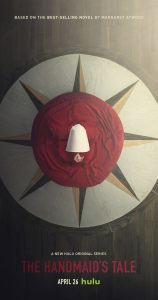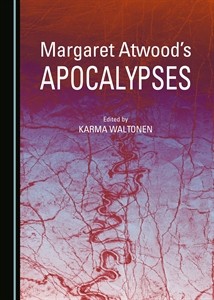For much of my youth, I was put off by dystopic visions. I’m not sure if this was because I was so frightened of what my own future could become, if I was horrified by the dark glimpses into human nature that dystopias provide or because I’d been frightened by a childhood viewing of an HBO special on Nostradamus, featuring explorations of a coming apocalypse that were rather hysterical (in both senses of the word). I eschewed all of the texts that would later captivate me (like Bladerunner) and settled on comforting visions of the future (like the socialist near paradise that was Star Trek). Then, in high school, there was The Handmaid’s Tale. One relative, who had not read the book, but who had heard some rumors about it, tried to deny me access, even though it was required reading. Luckily, I prevailed. It entranced me, both with its ideas and its language—which could be poetic and tragic and comic all at the same time. When Aunt Lydia tells the girls that they are rare and valued, like pearls, our narrator contemplates the metaphor: “I think about pearls. Pearls are congealed oyster spit” (145)—it was exactly the type of close reading that I was prone to do.
Perhaps the text drew me in because I identified with it. Atwood wrote parts of the novel in Alabama, very near where I was growing up (in “Florbama”—the part of Florida directly underneath Alabama). Her world seemed very real to me—I was deep in the Bible belt; our world history teacher was forbidden to acknowledge that there was any history before the ancient Egyptians, as that fact offended parents who believed the Earth was only 6000 years old; abstinence only education was standard; an abortion provider, David Gunn, was murdered in my town right around the time we encountered the handmaid’s repressive society.
I was electrified. Not all students responded the same way, of course. I remember one girl complaining that she didn’t like the book because it was disturbing. And I remember the teacher’s response: “Good. It’s supposed to disturb you.”
Those are the first three paragraphs of my introductory essay to Atwood’s Apocalypses.
I’m crazy excited about Hulu’s premiere today. It’s taking all my willpower to do work this morning instead of watching. Fingers crossed that this is better than the much maligned film (with a screenplay by Nobel Prize winner Harold Pinter)!
A review of the start will be coming soon.
In the meantime, are you excited about Atwood? Consider liking The Margaret Atwood Society on Facebook or following us on Twitter (@atwoodsociety)–we post lots of Atwood news there–for free!
Full membership is only $15.






